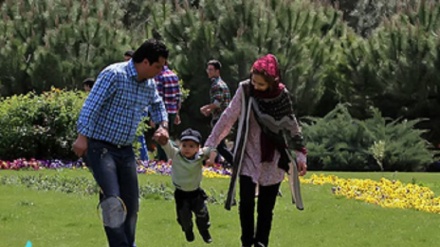Iranian Family (42)
We said that in the Islamic viewpoint, having children stabilizes and reinforces the foundation of families, and is a divine blessing. It is not appropriate for Muslims to decide not to have any children.
Having children is one of the most important factors in granting happiness and peace of mind to families. A famed author underscores that children bring about numerous benefits for the family, and one of the most significant advantages of having children is that they cheer up the family members.
Based on a body of research carried out by an accredited American university on 200,000 families from 86 countries around the world, having children lowers the parents' blood pressure, boosts their inclination to learn, enables them to make better use of their wisdom and prudence, cements their self-confidence, boosts the ability of parents in understanding their lives, makes them more meticulous, and finally cheers up parents.
Western critics and experts strongly believe that paramount importance should be attached to having children and their upbringing, given that absence of children disheartens families and the community, while also leading to the gradual death of a nation.
The Muslim scholar, Allameh Tabatabai, pointed out that one of the most important goals of the sacred religion of Islam is the growth of the population of Muslims in order to uproot polytheism and the corruption spread by polytheists.
He noted: one of the main aims of Islam is the growth of population of Muslims and development of land by them, which would in turn uproot polytheism and corruption. For this reason, this Muslim scholar names reproduction and upbringing children as the main goal of marriage.
One of the Islamic teachings which have been pointed out in Islamic narrations is that children are a divine blessing for parents and families. This blessing includes a number of feelings and behaviors which are widely linked to, and reinforce family's mental health and well-being. Hence, many Muslim families, who strongly believe in this principle, experience happy and blessed collective lives.
Another topic of importance which is emphasized by Islam is the effective and appropriate upbringing of children. Parents are duty-bound to provide a good upbringing for their children.
Children lack any understanding of the environment in the early years of their lives. As they gradually grow up, they gain a relative understanding of their living environment. Children's mindset resembles a transparent mirror which reflects any given development in the living environment.
Parents, as the sole and main role model for their children, should make every effort for the appropriate upbringing of their offspring in order to immune them from social vulnerabilities. According to psychologists, children learn the terms of communication and interaction with their community, and ethical criteria from their parents. The fact of the matter is that many children imitate their parents. Parenthood is the most important and challenging duty that any individual can have in his entire lifetime. In the meantime, many parents are preoccupied with their workplace-related concerns, and the everyday hassles of their families, imagining that upon provision of academic opportunities and registration of their children in a variety of classes, they have fulfilled their responsibilities toward their children. However, provision of an appropriate upbringing for children goes beyond meeting their material and financial needs. One should realize that children never forget what they learn at their homes.
A large number of children who have not had an appropriate upbringing, do not learn the terms of constructive interaction with the members of the community, lack life skills, and disregard ethical values, leading to shortcomings within the community.
Many families prefer marriage with relatives. According to a well-known Iranian psychologist, the inclination of families toward marriage of their children with relatives is due to their distrust toward strangers. However, unfortunately, a large number of marriages with relatives result in rare genetic ailments among children, some of which cannot be treated. Marriage with relatives also increases the chances of emergence of mental disorders among children.
MR/ME


